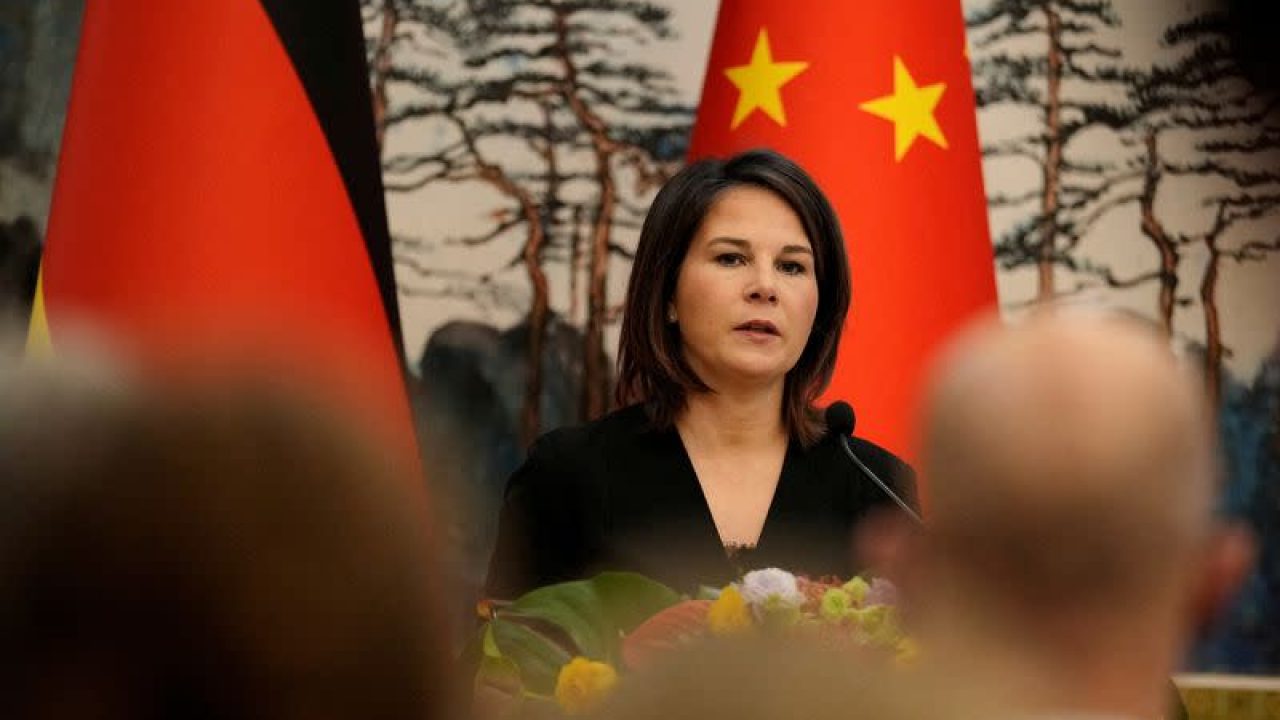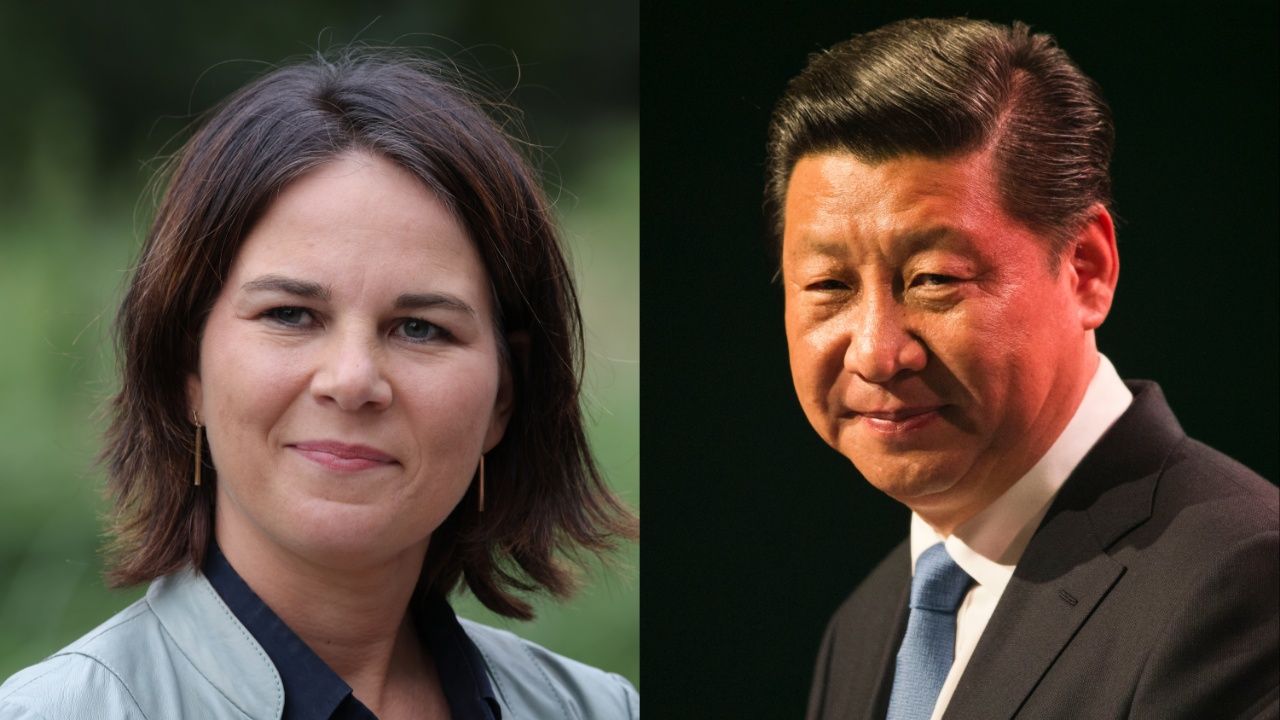China-Germany Tensions Soar High as Beijing Slams Baerbock’s ‘Dictator’ Remark for President Xi Jinping
China condemns Germany due to Annalena Baerbock's 'dictator' remark about President Xi Jinping calling it ‘Extremely Absurd’ and ‘Open Political Provocation.’

China-Germany Tensions Soar High as Beijing Slams Baerbock’s ‘Dictator’ Remark for President Xi Jinping
China has harshly condemned recent comments made by German Foreign Minister Annalena Baerbock through which she described Chinese President Xi Jinping as being a “dictator.” In an interview with Fox News, Baerbock made these comments while expressing Germany’s support for Ukraine as well as expressing concerns about dictatorial rulers like Xi.
“If Putin were to win this war, what sign would that be for other dictators in the world, like Xi, like the Chinese president?”
– Annalena Baerbock
On Monday, China’s foreign ministry spokesperson, Mao Ning, released a statement objecting to Baerbock’s remarks. According to the local news media, Mao Ning remarked that “China is strongly dissatisfied with and firmly opposes the German side’s remarks, which are extremely absurd, a serious infringement of China’s political dignity, and an open political provocation.” Mao Ning additionally disclosed that China had opened channels of diplomatic communication directly with the German government to discuss the situation.
Baerbock’s Criticism of China
In recent months, Annalena Baerbock has become well-known for her scathing criticism of the Chinese government. Her comments have covered a wide range of China’s worldwide behavior as well as policies. Most significantly, she has raised concerns about China’s aspirations for global dominance, denounced its abuses of human rights, and encouraged Beijing to firmly oppose Russia’s military intervention in Ukraine.
In July, Baerbock unveiled a new Chinese strategy which is aimed at decreasing Germany’s dependence on Beijing by “de-risking” German companies’ reliance on the country. She has additionally expressed reservations about China’s aggressive moves toward Taiwan, highlighting how a military conflict in the area would be catastrophic for the entire globe.

China’s Response To Comments
China’s reaction to Annalena Baerbock’s comments was immediate as well as unrepentant. Her remarks were described as “extremely absurd” by the Chinese authorities, who further charged that they gravely violated the country’s national honor and referred to them as a blatant political provocation. The German minister’s remarks particularly incensed China, according to Mao Ning, the foreign ministry’s spokesperson.
The underlying cause of the hostilities between the nations of Germany and China is the country’s new, July-introduced policy toward the Asian superpower. The strategy, which is the result of months of internal government discussions about Berlin’s approach to its largest trading partner, China, tries to deal with a more “assertive” China.
Germany’s New China Policy
Germany’s new China strategy is a prime instance of the coalition government’s need to strike a balance. China is described in the article as a “partner, competitor, and systemic rival.” Baerbock, a member of the Green Party, has taken a more critical position toward China than German Chancellor Olaf Scholz, a Social Democrat who has pushed toward a more trade-friendly strategy.
In her vocal criticisms of China, Baerbock has said that China is a threat to the core principles that support international cooperation. She has also voiced shock at certain parts of her visits to China, highlighting how some German authorities now view China as a systemic rival rather than just a trading partner.
Summoning Of German Ambassador- China’s Diplomatic Fury
Beijing summoned Patricia Flor, Germany’s ambassador, in the wake of Foreign Minister Annalena Baerbock’s controversial description of President Xi Jinping as being a “dictator,” which has caused tensions between the two countries to escalate. This action represents the most recent development in the two countries’ deteriorating commercial relations.
During an official trip to the United States, Baerbock, a well-known proponent of taking a more assertive approach towards China, had made the contentious comments in a conversation broadcast on Fox News. The Chinese response to Baerbock’s statements was straight-forward and completely unapologetic. Her remarks were judged to be utterly ludicrous, a grave insult to China’s political honour, as well as an outright political provocation for the Chinese foreign ministry. Beijing’s stance highlights once again how sensitive Chinese political leadership as well as governance concerns are.

Germany’s Response and Growing Tensions
The Chinese foreign ministry summoned Ambassador Patricia Flor on Sunday in response to Baerbock’s remarks, the German government has confirmed. This development came after China had expressed its severe displeasure with the remarks made by the German foreign minister.
While on a visit to New York, Baerbock responded that she had “taken note” of the protests in China when questioned about them. A government spokeswoman chose not to address the opinions of Chancellor Olaf Scholz, nevertheless. The spokesperson did stress how starkly the democratic values of Germany contrast with China’s political system, which has been characterized through a one-party Communist state.
This was the third occasion in a short while that China has summoned the ambassador of Germany, underscoring the escalating hostilities associated with the two countries. The earlier incidents consisted of being summoned following what was the first cabinet-level German visit to the island in twenty-six years, and the education minister’s trip to Taiwan in March. China has increased pressure on the democratic, self-governing island because it sees Taiwan as its territory that needs to be brought back together. Another summons was issued following a statement by the G7 foreign ministers regarding Taiwan in August 2022, when Germany was holding the group’s presidency.
Germany’s Evolving Stance on China
Germany’s coalition government has been divided by the country’s changing stance toward China. Berlin released a new strategy in July with the goal of controlling an even more “assertive” China. This policy, which refers to China as a “partner, competitor, and systemic rival,” illustrates the difficult balance within the government.
Baerbock, a Green Party member, has been a prominent supporter of taking a harder line towards China and putting more focus on human rights. Chancellor Scholz, a Social Democrat, has backed a stronger pro-trade strategy, in contrast. Berlin’s worries about potentially dangerous Chinese investments in Germany as well as German companies’ significant reliance on trade with China have also played a role in the policy change.
Recent events have proven Germany’s increased alertness in the face of Chinese investments as well as acquisitions in crucial areas. It was announced earlier this week that Germany has banned a Chinese takeover of a satellite company on national security concerns. Last year, the government blocked the sale of two chipmakers to Chinese investors on the grounds of security concerns, while a proposed sale of a share in Hamburg port to a Chinese corporation prompted a heated political debate, resulting in Chancellor Scholz’ acceptance of a smaller deal.

The recent exchange of words as well as diplomatic manoeuvrings between Germany and China highlights the complex web of international relations that the world community must manage. The complications of juggling the interests of the economy, political values, as well as strategic alliances have come to forefront recently following German Foreign Minister Annalena Baerbock’s description of Chinese President Xi Jinping as being a “dictator” along with Beijing’s subsequent summons of Berlin’s ambassador.
The topic in question has many facets, which is reflected in the diversity of opinions about it. While Baerbock’s remarks reflect worries about democratic values as well as human rights, they also highlight the increased scrutiny that China is receiving on a global scale. The requirement for pragmatism in foreign diplomacy is exemplified by the German government’s changing position on China, as seen by its new policy of handling a more “assertive” China.
While both countries are grappling with the complexity of their relationship with each other, one thing is certain: the circumstances surrounding the relationship between China and Germany are representative of bigger trends in the world’s political landscape. An increasing number of countries face an inherently risky dance between partnership, competitiveness, as well as institutional rivalry in an ever more interdependent globe.
Finally, the changing China-Germany relationship can be viewed as a reminder that diplomacy is an art that necessitates dexterity as well as adaptability. Maintaining the correct balance between trade interests and values-driven foreign policy is a tightrope walk, and the rest of the globe is watching these two powerful nations attentively as they attempt to traverse it. The next chapter of China-Germany relations, like the larger landscape of international diplomacy, is still being written, and it promises to present challenges that are both difficult as well as consequential.





